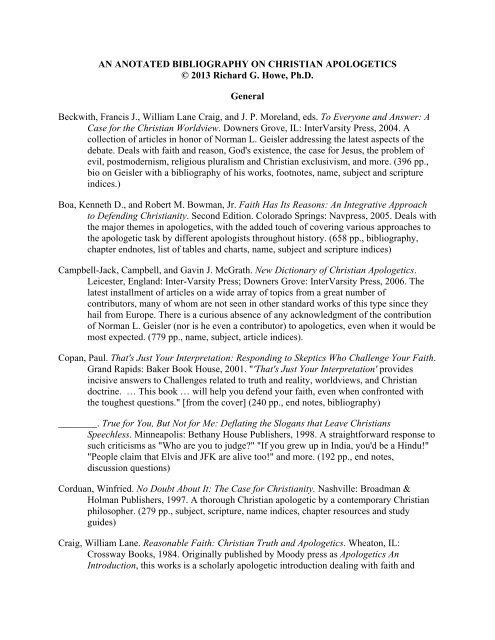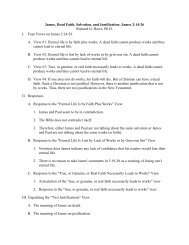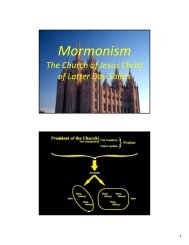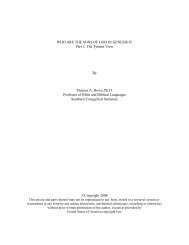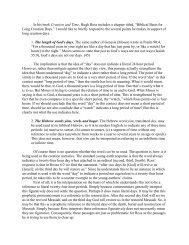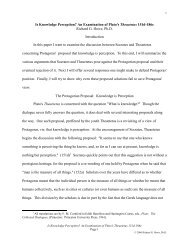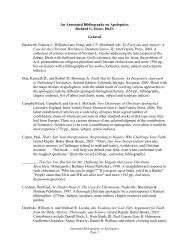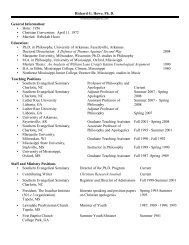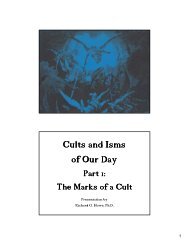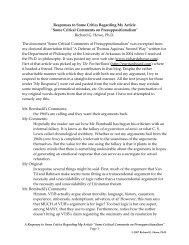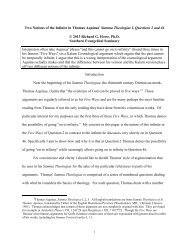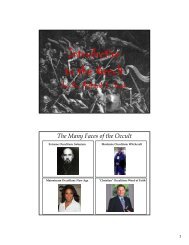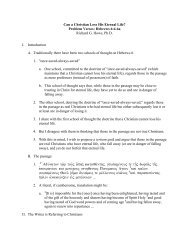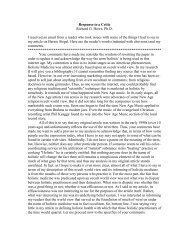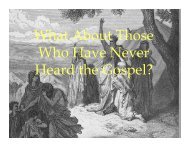Apologetics - Richard G. Howe
Apologetics - Richard G. Howe
Apologetics - Richard G. Howe
- No tags were found...
Create successful ePaper yourself
Turn your PDF publications into a flip-book with our unique Google optimized e-Paper software.
AN ANOTATED BIBLIOGRAPHY ON CHRISTIAN APOLOGETICS© 2013 <strong>Richard</strong> G. <strong>Howe</strong>, Ph.D.GeneralBeckwith, Francis J., William Lane Craig, and J. P. Moreland, eds. To Everyone and Answer: ACase for the Christian Worldview. Downers Grove, IL: InterVarsity Press, 2004. Acollection of articles in honor of Norman L. Geisler addressing the latest aspects of thedebate. Deals with faith and reason, God's existence, the case for Jesus, the problem ofevil, postmodernism, religious pluralism and Christian exclusivism, and more. (396 pp.,bio on Geisler with a bibliography of his works, footnotes, name, subject and scriptureindices.)Boa, Kenneth D., and Robert M. Bowman, Jr. Faith Has Its Reasons: An Integrative Approachto Defending Christianity. Second Edition. Colorado Springs: Navpress, 2005. Deals withthe major themes in apologetics, with the added touch of covering various approaches tothe apologetic task by different apologists throughout history. (658 pp., bibliography,chapter endnotes, list of tables and charts, name, subject and scripture indices)Campbell-Jack, Campbell, and Gavin J. McGrath. New Dictionary of Christian <strong>Apologetics</strong>.Leicester, England: Inter-Varsity Press; Downers Grove: InterVarsity Press, 2006. Thelatest installment of articles on a wide array of topics from a great number ofcontributors, many of whom are not seen in other standard works of this type since theyhail from Europe. There is a curious absence of any acknowledgment of the contributionof Norman L. Geisler (nor is he even a contributor) to apologetics, even when it would bemost expected. (779 pp., name, subject, article indices).Copan, Paul. That's Just Your Interpretation: Responding to Skeptics Who Challenge Your Faith.Grand Rapids: Baker Book House, 2001. "'That's Just Your Interpretation' providesincisive answers to Challenges related to truth and reality, worldviews, and Christiandoctrine. … This book … will help you defend your faith, even when confronted withthe toughest questions." [from the cover] (240 pp., end notes, bibliography)________. True for You, But Not for Me: Deflating the Slogans that Leave ChristiansSpeechless. Minneapolis: Bethany House Publishers, 1998. A straightforward response tosuch criticisms as "Who are you to judge?" "If you grew up in India, you'd be a Hindu!""People claim that Elvis and JFK are alive too!" and more. (192 pp., end notes,discussion questions)Corduan, Winfried. No Doubt About It: The Case for Christianity. Nashville: Broadman &Holman Publishers, 1997. A thorough Christian apologetic by a contemporary Christianphilosopher. (279 pp., subject, scripture, name indices, chapter resources and studyguides)Craig, William Lane. Reasonable Faith: Christian Truth and <strong>Apologetics</strong>. Wheaton, IL:Crossway Books, 1984. Originally published by Moody press as <strong>Apologetics</strong> AnIntroduction, this works is a scholarly apologetic introduction dealing with faith and
eason, the existence of God, the problem of miracles, the problem of historicalknowledge, and the resurrection. (349 pp. bibliography, endnotes, index)Dembski, William A. and Michael R. Licona, eds. Evidence for God: 50 Arguments for Faithfrom the Bible, History, Philosophy, and Science. Grand Rapids: Baker Books, 2010.Includes contributions from L. Russ Bush III, Paul Copan, William A. Dembski, Gary R.Habermas, and others. (272 pp., endnotes)Feser, Edward. The Last Superstition: A Refutation of the New Atheism. South Bend: St.Augustine's Press, 2008. A hard-hitting response to the "new" atheism bring to bear thephilosophical perspectives and arguments from the Aristotelian/Thomistic perspective.(299 pp., endnotes, index)Geisler, Norman L. Baker Encyclopedia of Christian <strong>Apologetics</strong>. Grand Rapids: Baker Books,1999. Geisler's magnum opus, probably the single best investment one can make inapologetic books. (841 pp., bibliography, article index, scripture index)Geisler, Norman L. and Paul K. Hoffman. Why I Am a Christian: Leading Thinkers Explain WhyThey Believe. Grand Rapids: Baker Books, 2001. "Offers compelling answers that willhelp free Christians from doubt and clear away obstacles to faith for unbelievers." [fromthe cover] Includes essays from William Lane Craig, Barry R. Leventhal, J.Budziszewski, J. P. Moreland and more. (318 pp., end notes)Geisler, Norman L. and Chad Meister, eds. Reasons for Faith: Making a Case for the ChristianFaith. Wheaton, IL: Crossway, 2007. A festschrift in honor of Bob and GretchenPassantino. Contributors include Josh McDowell, John Warwick Montgomery, H. WayneHouse, E. Calvin Beisner, J. P. Moreland, Francis J. Beckwith, Winfried Corduan, R.Douglas Geivett, <strong>Richard</strong> G. <strong>Howe</strong>, Gary R. Habermas, Ron Rhodes, and DouglasGroothuis.Geisler, Norman L. and Frank Turek. I Don't Have Enough Faith to Be an Atheist. Wheaton, IL:Crossway Books, 2004. An easily read work covering an amazing amount of ground.This book constitutes a fleshing out of Geisler and Turek's talk "12 Points that ProveChristianity is True." (447 pp., end notes, general and scripture indices)Hindson, Ed and Ergun Canner, eds. The Popular Encyclopedia of <strong>Apologetics</strong>: Surveying theEvidence for the Truth of Christianity. Eugene, OR: Harvest House Publishers, 2008. Ahandy, concise guide to a wide range of apologetic topics and figures. Over sixtycontributors including David Beck, Norman Geisler, Gary Habermas, <strong>Richard</strong> <strong>Howe</strong>,Tom <strong>Howe</strong>, Barry Leventhal, and Michael Licona.Kreeft, Peter. Between Heaven and Hell: A Dialog Somewhere Beyond Death With John F.Kennedy, C. S. Lewis and Aldous Huxley. Downers Grove, IL: Inter-Varsity Press, 1982,expanded edition, 2008. A very delightful, imaginary conversation between C. S. Lewis,John F. Kennedy, and Aldous Huxley (the Christian, the Humanist, and the Pantheist) onBibliography on Christian <strong>Apologetics</strong>Page 2© 2012 <strong>Richard</strong> G. <strong>Howe</strong>
God, the Bible, and Jesus Christ. Written in a "Socratic" dialogue. Excellent apologeticon the differences between Christianity and eastern religions (the New Age Movement).(144 pp., appendices, index)Lewis, C. S. Mere Christianity: What One Must Believe to Be a Christian. New York:Macmillan Publishing, 1943. A classic work that includes Lewis' BBC address of TheCase for Christianity, Christian Behavior and Beyond Personality. (190 pp.)Little, Paul E. Know Why You Believe: A Clear Affirmation of the Reasonableness of theChristian Faith. Downers Grove, IL: Inter-Varsity Press, 1968. A very good introductionto the issues. Chapter titles include, "Is Christianity Rational?", "Is There a God?", "Is theBible the Word of God", "Do Science and Scripture Conflict?", "Why Does God AllowSuffering?" (110 pp., footnotes, bibliography)McDowell, Josh. The New Evidence that Demands a Verdict. Nashville: Thomas NelsonPublishers, 1999. Full update of volumes one and two of Evidence that Demand aVerdict, with the aid of a team of researchers from Southern Evangelical Seminary withNorman Geisler. (760 pp., author and subject indices)Meister, Chad V. Building Belief: Constructing Faith from the Ground Up. Grand Rapids: BakerBooks, 2006. Meister leads the reader through his "<strong>Apologetics</strong> Pyramid" dealing withthe challenge of whether anything is really true, the question of God's existence, universalmorals and values, the reliability and divine inspiration of the Bible, the resurrection ofChrist, and ultimately, the good news that Jesus is the Son of God who offers salvation tothe world." [from the cover] (227 pp., end notes, index)Moreland, J. P. Scaling the Secular City: A Defense of Christianity. Grand Rapids, MI: BakerBook House, 1987. Probably one of the best single apologetics book available. Dealswith the most current objections to the faith. Must reading. (267 pp., footnotes,bibliography)Nash, Ronald H. The Gospel and the Greeks. Grand Rapids, MI: Zondervan/Probe, 1984.Originally titled Christianity and the Hellenistic World, this work examines the chargesthat Christianity borrowed its teachings from Greek philosophy and early pagan andmystery religions. The best book written that deals with this topic. (318 pp., end notes)Pearcey, Nancy. Total Truth: Liberating Christianity from Its Cultural Captivity. Wheaton, IL:Crossway Books, 2004. Probably the most thorough critique of the fact/value dichotomyand its devastating effect on contemporary culture available today. <strong>Howe</strong>ver, given thather thesis is adopted from her mentor Francis Shaeffer, students of philosophy may objectto her explanation of how our culture got where it is today, especially in her treatment ofThomas Aquinas. This should not detract too much from the book's valuablecontributions. (479 pp., bibliography, end notes, index, appendices)Bibliography on Christian <strong>Apologetics</strong>Page 3© 2012 <strong>Richard</strong> G. <strong>Howe</strong>
Sproul, R. C., John Gerstner and Arthur Lindsley. Classical <strong>Apologetics</strong>: A Rational Defense ofthe Christian Faith and a Critique of Presuppositional <strong>Apologetics</strong>. Grand Rapids, MI:Academie Books, 1984. Not only a good classical apologetic but also examines thepresuppositional apologetics method of Cornelius Van Til. (364 pp., end notes, index)Strobel, Lee. The Case for Faith: A Journalist Investigates the Toughest Objections toChristianity. Grand Rapids: Zondervan Publishing House, 2000. "For those who may befeeling attracted to Jesus but who are faces with intellectual barriers standing squarely intheir path." (from the cover) (409 pp., bibliography, endnotes, index)PhilosophyCorduan, Winfried. Handmaid to Theology: An Essay in Philosophical Prolegomena. GrandRapids: Baker Book House, 1981. Deals with the philosophical categories thatnecessarily help to shape theology showing "the inevitable reliance of theology on certainphilosophical concepts." (from the cover) (184 pp., bibliography, index)DeWeese, Garrett J. and J. P. Moreland. Philosophy Made Slightly Less Difficult: A BeginnersGuide to Life's Big Questions. Downers Grove, IL: InterVarsity Press, 2005. A helpfulintroduction to the major areas of philosophy including logic, metaphysics, epistemologyand ethics by two leading Christian philosophers. (170 pp., bibliography, end notes)Feser, Edward. Aquinas: A Beginner's Guide. Oxford: Oneworld, 2009. A very helpfulintroduction to the major aspects of Aquinas' thought. Feser is one of the best atexplaining complex ideas in very accessible ways. (205 pp., endnotes, bibliography,index)Geisler, Norman L. False Gods of Our Times: A Defense of the Christian Faith. Eugene, OR:Harvest House, Publishers, 1985. Very understandable and practical. Answers the falsegods of atheism, pantheism, and naturalism and their attacks on God, Christ, andmiracles. (206 pp., bibliography, end notes, glossary, index)________. Is Man the Measure? An Evaluation of Contemporary Humanism. Grand Rapids:Baker Book House, 1983. A thorough examine of various versions of humanism. (201pp., footnotes, bibliography)________. Miracles and the Modern Mind: A Biblical Defense of Biblical Miracles. GrandRapids, MI: Zondervan Publishing House, 1992. A complete re-working of his Miraclesand Modern Thought, this work is a cogent philosophical justification of the rationality ofbelief in miracles. Deals with the major philosophical attacks against miracles,particularly David Hume's. (163 pp., footnotes, bibliography, subject and person indices)Geisler, Norman L. and Ronald M. Brooks. Come Let Us Reason: An Introduction to LogicalThinking. Grand Rapids: Baker Book House, 1990. A handy guide to the fundamentalBibliography on Christian <strong>Apologetics</strong>Page 4© 2012 <strong>Richard</strong> G. <strong>Howe</strong>
principles of logical thinking. Covers syllogisms, informal fallacies, scientific thinkingand more. (232 pp., exercises and answers, subject index)Geisler, Norman L. and Paul D. Feinberg, Introduction to Philosophy: A Christian Perspective.Grand Rapids: Baker Book House, 1987. A basic introduction the main issues andcategories of philosophy including knowledge, reality and God. (447 pp., glossary)Geisler, Norman and Winfried Corduan. Philosophy of Religion, 2 nd ed. Grand Rapids: BakerBook House, 1988. A thorough treatment of the philosophical issue surrounding religion,including religious experience, reason, language and the problem of evil. (402 pp.,footnotes, bibliography, subject and name indices)Geisler, Norman L. and William D. Watkins. Worlds Apart: A Handbook on World Views. GrandRapids, MI: Baker Book House, 1989. [Originally titled Perspectives: Understandingand Evaluating Today’s World Views. Here's Life Publishers, 1984.] A handy referenceto various world views and how they differ from the Christian world view. HelpsChristians understand ". . . where others are coming from." Deals with atheism,polytheism, pantheism, panentheism, finite godism, and deism. (268 pp., chapter endnotes, index, bibliography, glossary)Geivett, R. Douglas and Gary R. Habermas, eds. In Defense of Miracles: A Comprehensive Casefor God's Action in History. Downers Grove, IL: InterVarsity Press, 1997. The best workto come out on the subject since Geisler's Miracles and Modern Thought. Containsarticles by such noted Christian scholars as Norman Geisler, J. P. Moreland, Francis J.Beckwith, William Lane Craig. Also contains the seminal work against miracles byDavid Hume, as well as an article by a contemporary Humean, atheist Antony Flew. (330pp., end notes, bibliography)Groothuis, Douglas. Truth Decay: Defending Christianity Against the Challenges ofPostmodernism. Downers Grove, IL: InterVarsity Press, 2000. "The concept of truth asabsolute, objective and universal has undergone serious deterioration in recent years.What factors have accelerated this decay of truth? In this spirited presentation of a solid,biblical and logical perspective, the author unveils how truth has come under attack."(from the cover) (303 pp., name and subject indices)Guinness, Os. Fit Bodies Fat Minds: Why Evangelicals Don't Think and What To Do About It.Grand Rapids, MI: Baker Book House, 1994. "Os Guinness traces the retreat of theevangelical mind and the dumbing down of evangelicalism through popular culture."(from the cover) (160 pp., end notes)Hoover, A. J. Don't You Believe It! Poking Holes in Faulty Logic. Chicago: Moody Press, 1982.Though strictly speaking not an apologetics book, this is a very helpful guide to the typesof fallacies people commonly make in their reasoning. Can help one be on guard againstsubtle, fallacious arguments. (132 pp.)Bibliography on Christian <strong>Apologetics</strong>Page 5© 2012 <strong>Richard</strong> G. <strong>Howe</strong>
<strong>Howe</strong>, Thomas. Objectivity in Biblical Interpretation. N.c.: Advantage Inspirational, 2004. Morethan just a work on the principles of hermeneutics, <strong>Howe</strong> delves into the complexities ofthe philosophy of language to uncover the relationship that language bears to reality,showing our ability as God's creatures to know objectively the meaning of the biblicaltext. Norman Geisler comments in the forward "Professor <strong>Howe</strong>'s deep knowledge ofbiblical languages, theology, and philosophy have enabled him to produce simply the bestdefense of the Evangelical belief in an objective interpretation of Scripture. This is truly amilestone and monumental work on this vital topic. In my forty-five years of teaching, Ihave seen nothing like it." (549 pp., chapter end notes, bibliography, person index)Moreland, J. P. Love Your God with All Your Mind: The Role of Reason in the Life of the Soul.Colorado Springs: Nav Press, 1997. A challenging book showing the importance of beinga thinking Christian and how to develop a Christian mind to "further God's kingdomthrough evangelism, apologetics, worship, and vocation." (from the cover) (245 pp., endnotes, appendices)Noebel, David A. Understanding the Times: The Story of the Biblical Christian, Marxist/Leninistand Secular Humanist Worldviews. Manitou Springs, CO: Summit Press, 1991. Thismassive work defends the Christian world view in the areas of theology, philosophy,ethics, biology, psychology, sociology, law, politics, economics, and history. A verythorough examination. (896 pp., chapter end notes, appendices, index)The Existence and Attributes of God/Problem of EvilCraig, William Lane. The Existence of God & the Beginning of the Universe. Here's LifePublishers, 1979. A popular version of Craig's technical work, The Kalam CosmologicalArgument. A very intriguing argument for God's existence from the impossibility of aninfinite past. (107 pp., chapter end notes)________. The Kalam Cosmological Argument. New York: Macmillan, 1979. From the Libraryof Philosophy and Religion series edited by John Hick, this book champions a modernversion of a formidable yet little known philosophical argument for the existence of Godthat reigned in Islam from the Middle Ages. Employs arguments from transfinitearithmetic and contemporary astronomy. (216 pp., end notes, index)Craig, William Lane and Walter Sinnott-Armstrong. God? A Debate Between a Christian and anAtheist. Oxford: Oxford University Press, 2004. An interesting exchange on the existenceof God by two philosophers. (156 pp., index)Craig, William Lane and Quentin Smith. Theism, Atheism, and Big Bang Cosmology. Oxford:Clarendon Press, 1995. "Contemporary science presents us with the remarkable theorythat the universe began to exist about fifteen billion years ago with a cataclysmicexplosion, the 'Big Bang.' But was this explosion created by God, or did it occur withcause? This book set out … a sustained debate between two philosophers … who byturns defend opposing positions in alternating chapters." [from the cover] A technicalBibliography on Christian <strong>Apologetics</strong>Page 6© 2012 <strong>Richard</strong> G. <strong>Howe</strong>
work that assumes knowledge of quantum physics to fully appreciate. (342 pp., subjectindex)Davies, Brian. The Reality of God and the Problem of Evil. London: Continuum, 2006. "Daviessuggests that we should start by attending to certain 'basics'—by asking why me mighthave reason to believe in God in the first place and by considering what our knowledge ofGod tell us (or does not tell us) about his nature. He then considers a number of famousattempts to deal with the problem of evil, and suggests that almost all of them fall short invarious ways." [from the cover] (264 pp., endnotes, bibliography, index)________. Thomas Aquinas on God and Evil. Oxford: Oxford University Press, 2011. "The firstin-depth study of Saint Thomas Aquinas's thoughts on God and evil … a clear andengaging guide for anyone who struggles with the relation of God and theology to theproblem of evil." [from the back cover] (172 pp., endnotes, bibliography, index)Dembski, William A. and Michael R. Licona. Evidence for God: Fifty Arguments for Faith fromthe Bible, History, Philosophy, and Science. Grand Rapids: Baker Books, 2010.Contributions from Darrell Bock, L. Russ Bush, III, Paul Copan, Gary R. Habermas andothers. (272 pp., end notes)Day, Vox. The Irrational Atheist: Dissecting the Unholy Trinity of Dawkins, Harris, andHitchens. Dallas: Benbella Books, 2008. "In this devastating critique of the anti-theisticarguments … Day skillfully demonstrates to even the most skeptical reader that the NewAtheists are no champions of Reason, but rather abandon Reason in their argumentsagainst religion." [from the flyleaf] (305 pp., footnotes, appendices, bibliography)Dolezal, James E. God without Parts: Divine Simplicity and the Metaphysics of God'sAbsoluteness. Eugene: Pickwick Publications, 2011. "Dolezel [examines] theimplications of divine simplicity for God's existence, attributes, knowledge, and will.Dolezal interacts extensively with older writers, such as Thomas Aquinas and theReformed scholastics, as well as more recent philosophers and theologians." [from theback cover] (239 pp., footnotes, bibliography, index)Feser, Edward. The Last Superstition: A Refutation of the New Atheism. South Bend: St.Augustine's Press, 2008. A powerful philosophical critique of the bankruptcy ofcontemporary mechanistic science and its role in the rising of the New Atheism. (299 pp.,end notes, index)Ganssle, Gregory E. Thinking about God: First Steps in Philosophy. Downers Grove, IL:InterVarsity Press, 2004. An excellent introduction to philosophy of religion. Gansslecovers issues such as the existence and attributes of God and the problem of evil. He alsolays out the elements of the current open theism debate. (187 pp., bibliography, index)Geisler, Norman L. Creating God in the Image of Man? The New "Open" View of God-Neotheism's Dangerous Drift. Minneapolis: Bethany House Publishers, 1997. ExposesBibliography on Christian <strong>Apologetics</strong>Page 7© 2012 <strong>Richard</strong> G. <strong>Howe</strong>
the drift away for a classical view of God and His attributes within contemporaryevangelicalism. (191 pp., index)________. If God, Why Evil? A New Way to Think about the Question. Minneapolis: BethanyHouse, 2011. "If God is all-good and all-powerful, why is there suffering in the world?Can't God put an end to murder, rape, and starvation? … In this concise but thoroughbook, Dr. Norman Geisler carefully answers these tough questions using step-by-stepexplanations and compelling examples." [from the cover] (173 pp., bibliography)Geisler, Norman L., H. Wayne House and Max Herrera. The Battle for God: Responding to theChallenge of Neotheism. Grand Rapids: Kregel Publications, 2001. A more in-depthexamination than Creating God in the Image of Man? this work not only deals with theencroachment of the "open" view but also the more subtle attacks on other classicalattributes of God. (336 pp., bibliography, index)Hitchens, Peter. The Rage Against God: How Atheism Let Me to Faith. Grand Rapids:Zondervan, 2010. "Two brothers. Two beliefs. Two revolted. One returned." [from thecover] (224 pp.)House, H. Wayne. Charts on Open Theism and Orthodoxy. Grand Rapids: Kregel, 2003. Ahandy cross-reference on various aspects of the battle between the new "open" view ofGod and the classic orthodox view of God. (139 pp., bibliography)Huffman, Douglas S. and Eric L. Johnson, eds. God Under Fire: Modern Scholarship ReinventsGod. Grand Rapids: Zondervan, 2002. A response to recent attacks on the classicalChristian view of God, this work addresses such issues as God and time, whether Godchanges, and God and evil. Contributors include Paul Helm, William Lane Craig, D. A.Carson and others. (325 pp. Scripture, author, and subject indices)Jastrow, Robert. God and the Astronomers. New York: W. W. Norton, 1978. A summary ofscientific evidence that points to the possibility of a cosmic creator and designer by anagnostic astronomer. (136 pp., index)McCabe, Herbert. God and Evil in the Theology of St. Thomas Aquinas. "[McCabe] demonstrateswhy it cannot be shown that evil disproves God's existence. He also explains how we canrightly think of evil in a world made by God." [from the back cover] (205 pp.,appendices, bibliography, index)Marshall, David. The Truth Behind the New Atheism: Responding to the Emerging Challenges toGod and Christianity. Eugene, OR: Harvest House Publishers, 2007. A very well writtenand penetrating critique of the latest flood of atheism as characterized by <strong>Richard</strong>Dawkins, Sam Harris, and Christopher Hitchens. (236 pp., end notes)Miethe, Terry and Antony Flew. Does God Exist? A Believer and an Atheist Debate. New York:Harper Collins Publishers, 1991. Examines many aspects of the question including theBibliography on Christian <strong>Apologetics</strong>Page 8© 2012 <strong>Richard</strong> G. <strong>Howe</strong>
urden of proof, God and metaphysics, the significance of choice, and the ultimates andlimits of explanation. Also contains contributions from A. J. Ayer, <strong>Richard</strong> Swinburne,and a forward by Hans Küng. (296 pp., end notes, appendices, bibliography)Moreland, J. P. and Kai Nielsen. Does God Exist? The Debate Between Theists & Atheist.Amherst, NY: 1993. [Originally published as Does God Exist? The Great Debate.Nashville: Thomas Nelson Publishers, 1990.] Contains the transcripts of a debate whichtook place in March, 1987 at the University of Mississippi. Also contains articles by twoother Christian philosophers, William Lane Craig and Dallas Willard, and articles by twoother atheists, Keith Parsons and Antony Flew. Deals not only with the existence of God,but with the relationship of God to morality. (320 pp., chapter end notes, bibliography)Rhodes, Ron. Answering the Objections of Atheists, Agnostics, & Skeptics. Eugene, OR: HarvestHouse Publishers, 2006. A very accessible treatment of sometimes difficult subjectmatter. Rhodes deals with the existence of God, evolution and intelligent design,morality, the reliability of the Bible, the evidence for Jesus and His resurrection, and theproblem of evil. (294 pp., bibliography, end notes, appendices)Rocca, Gregory P. Speaking the Incomprehensible God. Washington: The Catholic University ofAmerica Press, 2004.Spitzer, Robert J. New Proofs for the Existence of God: Contributions of Contemporary Physicsand Philosophy. Grand Rapids: William B. Eerdmans, 2010. "Responding tocontemporary popular atheism [Spitzer] … examines the considerable evidence for Godand creation that has come to light from physics and philosophy during the last fortyyears." [from the cover] (319 pp., bibliography, index)Sproul, R. C. If There Is A God, Why Are There Atheists? A Surprising Look at the Psychology ofAtheism. Minneapolis: Bethany Fellowship, 1978. A classic work by Sproul. Explainswhy some people are atheists, and why their position is without logical foundation. (166pp., end notes, index)Strobel, Lee. The Case for a Creator: A Journalist Investigates Scientific Evidence that PointsToward God. Grand Rapids: Zondervan, 2004. An interview style in which Strobel talkswith the leading thinkers regarding science and God. Deals with evolution, science andfaith, physics, astronomy, biochemistry and more. (340 pp., end notes, group study guide,index)The BibleBauckham, <strong>Richard</strong>. Jesus and the Eyewitnesses: The Gospels as Eyewitness Testimony. (538pp., footnotes, ancient persons, modern authors, places, scripture and other ancientliterature indices)Bibliography on Christian <strong>Apologetics</strong>Page 9© 2012 <strong>Richard</strong> G. <strong>Howe</strong>
Boice, James Montgomery, ed. The Foundation of Biblical Authority. Grand Rapids: ZondervanPublishing Company, 1978. The precursor to the more detailed works that theInternational Council on Biblical would do, this book serves as an excellent overview tothe content and importance of Biblical inerrancy. Contains articles by R. C. Sproul, JohnGerstner, J. I. Packer, and others. (172 pp., chapter end notes, subject, name, andscripture index)Brake, Donald L. A Visual History of the English Bible: The Tumultuous Tale of the World'sBestselling Book. Grand Rapids: Baker Books, 2008.Campbell, Gordon. Bible: The Story of the King James Version. Oxford: Oxford UniversityPress, 2010.Cowan, Steven B. and Terry L. Wilder, eds. In Defense of the Bible: A ComprehensiveApologetic for the Authority of Scripture. Nashville: Broadman and Holman Publishing,2013. (490 pp., footnotes, name, subject, and Scripture indices)Evans, G. R. John Wyclif: Myth and Reality. Downers Grove: InterVarsity Press, 2005.Geisler, Norman L., ed. Biblical Errancy: An Analysis of its Philosophical Roots. Grand Rapids,MI: Zondervan Publishing Company/ICBI, 1981. The second in the series from theInternational Council on Biblical Inerrancy, an analysis of the philosophical roots of thecontemporary attacks on the Bible. (270 pp., end notes, index)Geisler, Norman L., ed. Inerrancy. Grand Rapids, MI: Zondervan Publishing Company/ICBI,1979. The first in the series from the International Council on Biblical Inerrancy. Dealswith what it means to claim that the Bible has no errors. (515 pp., end notes, index)Geisler, Norman L. and Thomas <strong>Howe</strong>. When Critics Ask: A Popular Handbook on BibleDifficulties. Wheaton, IL: Victor Books, 1992. From Genesis to Revelation, covers everymajor Bible difficulty, including alleged mistakes and contradictions. (604 pp., subject,scripture indices, appendices)Geisler, Norman L. and William E Nix. A General Introduction to the Bible. Chicago: MoodyPress, 1986. One of the best books available that deals with such areas as inspiration(Who wrote the Bible?), canonization (Which books belong in it?), transmission (Has itbeen accurately preserved?), and translation (Has it been accurately translated?) (724 pp.,subject, person, and scripture indices, bibliography)Geisler, Norman L. and William C. Roach. Defending Inerrancy: Affirming the Accuracy ofScripture for a New Generation. Grand Rapids: Baker Books, 2011. Geisler and Roachre-examing the crucial issue of inerrancy. Provides a very helpful history and analysis ofICBI and its bearing on the contemporary erosions of inerrancy within evangelicalism.(378 pp., endnotes, bibliography)Bibliography on Christian <strong>Apologetics</strong>Page 10© 2012 <strong>Richard</strong> G. <strong>Howe</strong>
Hanna, John D., ed. Inerrancy and the Church. Chicago: Moody Press, 1984. The fourth in theseries from the International Council on Biblical Inerrancy. "This in-depth investigationinto the writing of key church Fathers, Scholastics, Reformers, and later thinkersexamines the history of the controversy over biblical inerrancy to give perspective to ourthinking." [from the back cover] (422 pp., subject and person indices, footnotes)Hurtado, Larry W. The Earliest Christian Artifacts: Manuscripts and Christian Origins. GrandRapids: Wm. B. Eerdmans, 2006. "Drawing on studies by papyrologists andpaleographers as well as New Testament scholars … [this work] astutely examines thedistinctive physical features of early Christian manuscripts, illustrating their relevance forwider inquiry into the complex origins of Christianity." [from the back cover] (248 pp.,footnotes, bibliography, appendices, author and manuscript indices)Keener, Craig S. Miracles: The Credibility of the New Testament Accounts. 2 vols. GrandRapids: Baker Academic, Baker Publishing, 2011. The most thorough examination of theissue of miracles historically and philosophically. (1,172 pp., appendices, bibliography,subject, author, Scripture, and Ancient Sources indices)Lewis, Gordon and Bruce Demarest, eds. Challenges to Inerrancy: A Theological Response.Chicago: Moody Press/ICBI, 1984. The third in the series from the International Councilon Biblical Inerrancy, this work answers some of the most influential modernpresuppositions that lead to the denial of an inerrant Bible. (414 pp., footnotes, subject,person and scripture indices)Lindsell, Harold. The Battle for the Bible. Grand Rapids, MI: Zondervan Publishing Company,1976. A book that shook the evangelical world as Lindsell chronicled how majorcontemporary denominations have changed their stand on the Bible. (218 pp., chapter endnotes, subject index)________. The Bible in the Balance: A Further Look at the Battle for the Bible. Grand Rapids,MI: Zondervan Publishing Company, 1979. A further look at the battle for the Bible.Lindsell updates his report and responds to the criticism of his first book. (384 pp.,chapter end notes, index)Linnemann, Eta. Biblical Criticism on Trial: How Scientific is "Scientific Theology"? Translatedby Robert Yarborough. Grand Rapids: Kregel Publications, 2001. The third popular workby Linnemann translated into English. Linnemann examines a variety of claims aboutsuch issues as the Q document, whether Paul wrote all the epistles attributed to him,whether numerous New Testament books were written long after the apostles and more.(217 pp., bibliography, index)________. Historical Criticism of the Bible: Methodology or Ideology? Reflections of aBultmannian turned Evangelical. Translated by Robert W. Yarbrough. Grand Rapids,MI: Baker Book House, 1990. "Profoundly challenges the very idea of knowledge thatdominates the modern university or college, secular and Christian." (Dallas Willard,Bibliography on Christian <strong>Apologetics</strong>Page 11© 2012 <strong>Richard</strong> G. <strong>Howe</strong>
Philosophy Professor, University of Southern California, from the cover.) A scathingcritique of modern biblical "criticism." (169 pp., subject, scripture indices)________. Is There a Synoptic Problem? Rethinking the Literary Dependence of the First ThreeGospels. Translated Robert W. Yarbrough. Grand Rapids, MI: Baker Book House, 1992.A refutation of the "standard" view of the literary dependence theory of the developmentof the synoptic gospels. (219 pp., bibliography, index)McDowell, Josh. More Evidence That Demands A Verdict: Historical Evidences for theChristian Scriptures. Campus Crusade, 1975. The sequel to his best seller. Deals with thehistorical accuracy and integrity of the Bible. (365 pp., text notes, bibliography) [seeentry The New Evidence]Nash, Ronald H. The Word of God and the Mind of Man: The Crisis of Revealed Truth inContemporary Theology. Grand Rapids, MI: Zondervan Publishing Company, 1982. Aphilosophical treatment of the nature of God's revelation of Himself to man through theBible. (137 pp., footnotes, index)Nicolson, Adam. God's Secretaries: The Making of the King James Bible. New York:HarperCollins Publishers, 2003.Parker, D. C. Codex Sinaiticus: The Story of the World's Oldest Bible. Peabody, MA:Hendrickson Publishing, 2010.Radmacher, Earl D. and Robert D. Preus, eds. Hermeneutics, Inerrancy & the Bible: Papersfrom ICBI Summit II. Grand Rapids, MI: Academie Books/ICBI, 1984. The fifth and lastin the series from the International Council on Biblical Inerrancy, this books containssixteen major papers from their Summit II Conference. Covers such subjects as Truth:Relationships of Theories of Truth to Hermeneutics, Adequacy of Language andAccommodation, The Role of Logic in Biblical Hermeneutics. (921 pp., chapter endnotes)Robinson, James M. The Story of the Bodmer Papyri: From the First Monastery's Library inUpper Egypt to Geneva and Dublin. Eugene, OR: Cascade Books, 2011.Thomas, Robert and F. David Farnell, eds. The Jesus Crisis: The Inroads of Historical Criticisminto Evangelical Scholarship. Grand Rapids: Kregel Publications, 1998. A neededcritique of the dangerous and increasing influences of here-to-fore liberal methodologieson current evangelicalism, including redaction criticism and the synoptic problem. (416pp., author, scripture, and subject indices)ChristBoyd, Gregory A. Cynic, Sage or Son of God? Recovering the Real Jesus in an Age ofRevisionist Replies. Wheaton, IL: Victor Books, 1995. A thorough response to the JesusBibliography on Christian <strong>Apologetics</strong>Page 12© 2012 <strong>Richard</strong> G. <strong>Howe</strong>
Seminar's revisionist treatments of Jesus. (416 pp., endnotes, bibliography, subject andauthor indices)Bruce, F. F. Jesus and Christian Origins Outside the New Testament. Grand Rapids: William B.Eerdmans, 1974. A handy guide to historical references to Christianity outside the Bible.(216 pp., footnotes, index, bibliography)Copan, Paul, ed. Will the Real Jesus Please Stand Up? A Debate Between William Lane Craigand John Dominic Crossan. Grand Rapids: Baker Books, 1998. A debate between Craig,noted evangelical scholar, and Crossan former co-chair of the Jesus Seminar. The debatewas moderated by William F. Buckley, Jr. ( 186 pp., index)Groothuis, Douglas. Jesus in an Age of Controversy. Eugene, OR: Harvest House Publishers,1996. An expanded, revised edition of his Confronting the New Age Jesus, Groothuis"provides the historical and logical evidence that confirms biblical teaching about Jesus."[form the cover] (374 pp., endnotes, index)Habermas, Gary. The Historical Jesus: Ancient Evidence for the Life of Christ. Joplin, MO:College Press, 1996. [Formerly The Verdict Of History: Conclusive Evidence for the Lifeof Jesus. Nashville: Thomas Nelson Publishers, 1988.] The best and most up to datereference source on the historicity of Jesus. (301 pp., subject and scripture indices,bibliography)Habermas, Gary R. and Michael R. Licona. The Case for the Resurrection of Jesus. GrandRapids: Kregel Publications, 2004.Hoehner, Harold W. Chronological Aspects of the Life of Christ. Grand Rapids: ZondervanPublishing House, 1977. A close look at issues such as the year and day of Christ's birth,the day of the week of the crucifixion and the resurrection. Grand Rapids:Hurtado, Larry W. How on Earth Did Jesus Become a God? Historical Questions about EarliestDevotion to Jesus. "Hurtado investigates the intense devotion to Jesus that emerged withsurprising speed after his death. … The follow-up to Hurtado's award winning Lord JesusChrist (2003), this book provides compelling answers to queries about the developmentof the church's belief in the divinity of Jesus." [from the back cover] (234 pp., footnotes,appendices, modern author, subject, and Scripture and other ancient sources indices)________. Lord Jesus Christ: Devotion to Jesus in Earliest Christianity. Grand Rapids: WilliamB. Eerdman's Publishing, 2003. An in-depth look at how the early Christians came toregard Jesus, including a look at the context of Jewish monotheism, the influence of Paul,the nature of early Jewish Christianity, and much more. The book is especially valuableas a correct to the highly influential work of Wilhelm Bousset. (746 pp., footnotes,bibliography, modern authors, subjects, and ancient sources indices)Bibliography on Christian <strong>Apologetics</strong>Page 13© 2012 <strong>Richard</strong> G. <strong>Howe</strong>
McDowell, Josh. More than a Carpenter. Wheaton, IL: Tyndale House Publishers, 1977. A goodbook to share with an inquiring friend about who Jesus is and why He is unique. (massmarket paperback, chapter end notes)Strobel, Lee. The Case for Christ: A Journalist's Personal Investigation of the Evidence of Jesus.Grand Rapids: Zondervan Publishing House, 1998. "Retracing his own spiritual journeyfrom atheism to faith, Lee Strobel, former legal editor of the Chicago Tribune, crossexaminesa dozen experts with doctorates from school like Cambridge, Princeton, andBrandeis who are recognized authorities in their own fields." (from the cover) (397 pp.,bibliography, endnotes, index)Wilkins, Michael J. and J. P. Moreland, eds. Jesus Under Fire: Modern Scholarship Reinventsthe Historical Jesus. Grand Rapids, MI: Zondervan Publishing House, 1995. Excellentcollection of essays from evangelical scholars on Jesus. (243 pp., subject, author,scripture indices, bibliography)Yamauchi, Edwin M. Jesus Zoroaster Buddha Socrates Muhammad. Downers Grove, IL: Inter-Varsity Press, 1972. An excellent pamphlet showing the uniqueness of Jesus. (booklet, 46pp., end notes)The ResurrectionCopan, Paul and Ronald K. Tacelli, eds. Jesus' Resurrection: Fact or Fiction? A Debate BetweenWilliam Lane Craig and Gerd Lüdemann. Downers Grove, IL: InterVarsity Press, 2000."A lively and provocative debate" between a Christian philosopher and theologian and anatheist New Testament scholar that took place at Boston College. (206 pp., footnotes)Craig, William Lane. The Son Rises: Historical Evidence for the Resurrection of Jesus. Chicago:Moody Press, 1981. Another excellent treatment of the historical evidences for theresurrection of Jesus Christ. Also deals with the Shroud of Turin, hallucinations, andpara-psychological phenomena. (156 pp., chapter end notes)Geisler, Norman L. The Battle for the Resurrection. Nashville: Thomas Nelson Publishers, 1989.Addresses the errors of the resurrection that are beginning to plague the evangelicalchurch. (223 pp. end notes, appendices, glossary, bibliography, scripture and subjectindices)Habermas, Gary and Anthony Flew. Did Jesus Rise from the Dead? The Resurrection Debate.New York: Harper & Row, 1987. The actual transcript of a debate which took place atLiberty Baptist University between Christian apologist Habermas and atheist humanistFlew. (190 pp., end notes, bibliography)Morison, Frank. Who Moved The Stone? A Journalist’s Incisive Investigation into theTruthfulness of Christ’s Resurrection. Grand Rapids, MI: Zondervan PublishingBibliography on Christian <strong>Apologetics</strong>Page 14© 2012 <strong>Richard</strong> G. <strong>Howe</strong>
Company, 1958. The testimony of one who sought to disprove the resurrection, only toend compelled by the evidence and come to faith in Christ. (193 pp.)Wenham, John. Easter Enigma: Are the Resurrection Accounts in Conflict? 2nd ed., GrandRapids, MI: Baker Book House, 1992. Probably the best work dealing with the allegedconflicts in the resurrection accounts between the gospel writers. Wenham contends thatthe accounts can be satisfactorily reconciled as they stand. (168 pp., end notes,appendices, scripture, author, and subject indices)ScienceBehe, Michael J. Darwin's Black Box: The Biochemical Challenge to Evolution. New York: TheFree Press, 1996. A ground-breaking work explaining what Behe refers to as irreduciblecomplexity of biological systems. (307 pp., index)Bird, W. R. The Origin of Species Revisited: The Theories of Evolution and of AbruptAppearance. Nashville: Regency, 1991. The most thorough collection informationpertaining to the entire Creation/Evolution debate which has received praises from bothCreationists and Evolutionists alike. In this two volume set, Bird covers issues of science,philosophy of science, philosophy of religion, history, education, and the constitutionalityof teaching creationism (abrupt appearance) in public schools. (vol. I 551 pp., vol. II 563pp., chapter end notes, author index, subject index)Blackwell, <strong>Richard</strong> J. Galileo, Bellarmine, and the Bible. Notre Dame: University of NotreDame Press, 1991. A one-of-a-kind collection of primary material with fresh Englishtranslations together with insightful analysis. A must-read for those interested in thehistory of the science/religion interactions. (291 pp., footnotes, bibliography, index)Dembski, William A. The Design Inference : Eliminating Chance Through Small Probabilities(Cambridge Studies in Probability, Induction and Decision Theory). New York:Cambridge University Press, 1998. Technical treatise on the mathematical aspects ofchance and design.________. The Design Revolution: Answering the Toughest Questions about Intelligent Design.Downers Grove, IL: InterVarsity Press, 2004. The latest by the leader of the IDmovement. "Written with a general audience in mind, Dembski responds to more than 60questions often posed at his lectures. They range from vague ideas people have aboutintelligent design and creationism to how to distinguish design from chance andnecessity. Clears up a number of common misconceptions." [from the cover] (330 pp.)________. Intelligent Design: The Bridge Between Science and Theology. Downers Grove, IL:InterVarsity Press, 1999. A more popular commentary to his technical work The DesignInference : Eliminating Chance Through Small Probabilities. Represents the mostsophisticated defense to date of the notion of intelligent design, considered both as amathematical and philosophical concept. (312 pp., end notes, index)Bibliography on Christian <strong>Apologetics</strong>Page 15© 2012 <strong>Richard</strong> G. <strong>Howe</strong>
Dembski, William A., ed. Mere Creation: Science, Faith and Intelligent Design. DownersGrove, IL: InterVarsity Press, 1998. The best collection of essays on the subject ofintelligent design in nature. Includes articles by notable scholars as Michael Behe, PhilipJohnson, William Lane Craig, J. P. Moreland. (475 pp., index)Dembski, William A. and James M. Kushiner, eds. Signs of Intelligence: UnderstandingIntelligent Design. Grand Rapids: Baker Books, 2001. "Signs of Intelligence presentsfourteen essays by the main players (including Johnson, Behe, and Dembski) in theintelligent design movement. [from the cover] (224 pp., endnotes)Denton, Michael. Evolution: A Theory in Crisis. New Developments in Science are ChallengingOrthodox Darwinism. Bethesda, MD: Adler & Adler, 1986. A scathing critique ofevolution by an Australian M.D. who is not necessarily making a Christian argument.(368 pp., chapter end notes, index)Geisler, Norman L. The Creator in the Courtroom: The Controversial Arkansas Creation-Evolution Trial. Milford, MI: Mott Media, 1982. An eye-opening study of the historicand controversial 1981 Arkansas Creation-Evolution trial (McLean vs. Arkansas). (242pp.)________. Knowing the Truth about Creation: How It Happened and What It Means for Us. AnnArbor, MI: Servant Books, 1989.Geisler, Norman L. and Kerby Anderson. Origin Science: A Proposal for the Creation-EvolutionControversy. Grand Rapids, MI: Baker Book House, 1987. A ground-breaking bookwhich introduces the distinctions between operation and origin science. (198 pp., endnotes, person and subject indices, bibliography)Hannam, James. The Genesis of Science: How the Christian Middle Ages Launched the ScientificRevolution. Washington: Regnery Publishing, 2011. "A very useful general survey of adifficult topic, and a robust defense of an unfairly maligned age." (Spectator) [from thecover] (454 pp., end notes, bib., index)Hummel, Charles E. The Galileo Connection: Resolving Conflicts between Science and theBible. Downers Grove, IL: InterVaristy Press, 1986. Sets the science/religioncontroversies in their historical perspectives, dealing with Copernicus, Kepler, Galileoand Newton. (293 pp., end notes, person and subject indices)Johnson, Phillip. Darwin on Trial. Washington, D. C.: Regnery Gateway, 1991. A lawyer skilledin the examination of presupposition and arguments, Johnson "took up the study ofDarwinism because he saw that the books defending the theory were dogmatic andunconvincing." This book "is a cogent and stunning tour de force that not only rattles thecages of conventional wisdom, but could provide the basis for a fundamental change inthe way educated Americans regard themselves, their origins, and their fate." (from theflyleaf) (195 pp., end notes, index)Bibliography on Christian <strong>Apologetics</strong>Page 16© 2012 <strong>Richard</strong> G. <strong>Howe</strong>
the world. … Meyer shows that digital code embedded in DNA points to a designingintelligence and helps unravel a mystery that Charles Darwin did not address: how didlife begin?" [from the cover] (611,pp., endnotes, bibliography, index)Moore, John N. Questions and Answers on Creation/Evolution. Grand Rapids, MI: Baker BookHouse, 1976, 4th printing, 1981. A handy reference to the debate by a Professor ofNatural Science at Michigan State University. (pb, 110 pp., footnotes, bibliography)Moreland, J. P. Christianity and the Nature of Science: A Philosophical Investigation. GrandRapids, MI: Baker Book House, 1989. With this book the author wants to "facilitate andencourage Christians to think more clearly about the relationship between science andtheology." It dispels the notion that science is a matter of rational analysis andChristianity is a matter of faith. (263 pp., bibliography)Moreland, J. P., ed. The Creation Hypothesis: Scientific Evidence for an Intelligent Designer.Downers Grove, IL: InterVarsity Press, 1994. A very important contribution to thecreationism debate. This material is on the cutting edge in philosophy and science. Mustreading for those who wish to stay apprised of the latest dimensions of this debate as faras the philosophical angle is concerned. Though somewhat advanced, it promisesdividends for those who labor through it. (335 pp. end notes, appendix)Numbers, Ronald L., ed. Galileo Goes to Jail: And Other Myths about Science and Religion.Cambridge, Harvard University Press, 2009. A treatment of twenty-five myths aboutscience and religion, including "That the Medieval Christian Church Suppressed theGrowth of Science," "That Copernicanism Demoted Humans from the Center of theCosmos," and "The Galileo Was Imprisoned and Tortured for AdvocatingCopernicanism." (302 pp., endnotes, index)Pearcey, Nancy R. and Charles B. Thaxton. The Soul of Science: Christian Faith and NaturalPhilosophy. Wheaton, IL: Crossway Books, 1994. Deals with the history and nature ofscience and shows that "the alliance between atheism and science is a temporaryaberration … and that Christian theism has played and will continue to play an importantrole in the growth of scientific understanding." (from the cover) (298 pp., endnotes,bibliography, index)Spitzer, Robert J. New Proofs for the Existence of God: Contributions of Contemporary Physicsand Philosophy. Grand Rapids: William B. Eerdmans Publishing, 2010. "Responding tothe contemporary popular atheism, Robert J. Spitzer's [book] examines the considerable eidence for God and creation that has come to light from physics and philosophy duringthe last forty years. An expert in divers areas, including theology, physics, metaphysics,and ethics, Spitzer offers in this text themost contemporary, complete, and integratedapproach to rational theism currently available." (from the cover). (319 pp., footnotes,bibliography, index)Bibliography on Christian <strong>Apologetics</strong>Page 18© 2012 <strong>Richard</strong> G. <strong>Howe</strong>
Sproul, R. C. Not a Chance: The Myth of Chance in Modern Science and Cosmology. GrandRapids: Baker Books, 1994. "In a lively dialog with modern thinkers from Hume to NielsBohr and Carl Sagan, Not a Chance consults laws of logic, linguistic and scientifictheory, and mathematical understandings to probe the cause-effect relationship." (fromthe flyleaf) (234 pp., bibliography, subject and name indices)Thaxton, Charles B., Bradley, Walter L., and Olsen, Roger L. The Mystery of Life's Origin:Reassessing Current Theories. New York: Philosophical Library, 1986. Provides acomprehensive critique of chemical evolution using established principles of physics andchemistry. Technical and advanced, recommended for those with a background in anatural science. (228 pp., footnotes, index, bibliography)Whitcomb, John C. and Henry Morris. The Genesis Flood: The Biblical Record and its ScientificImplications. Grand Rapids, MI: Baker Book House, 1961. A thorough treatment of theBiblical record and its scientific implications. (518 pp., footnotes, name, subject, andscripture indices)Woodward, Thomas. Doubts about Darwin: A History of Intelligent Design. Grand Rapids:Baker Books, 2003. A look at the ID movement from Michael Denton to WilliamDembski. Interesting information about the movers and shakers of ID such as PhillipJohnson and Michael Behe. (303 pp., end notes, bibliography, index)Bibliography on Christian <strong>Apologetics</strong>Page 19© 2012 <strong>Richard</strong> G. <strong>Howe</strong>


